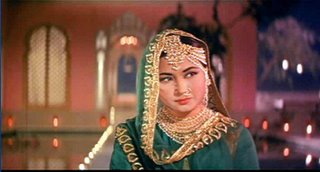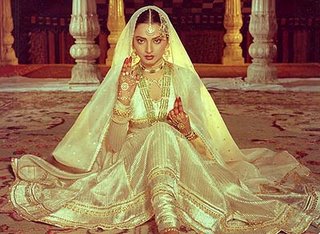
Entertaining men and yearning for love, nautch girls are very much a part of the Bollywood dream. Dibyajyoti Sarma traces a few who take special place in our hearts
Muzaffar Ali must be a very sad man these days. His Umrao Jaan returns to the silver screen again, looking stunning than ever. As J P Dutta’s Umrao Jaan hits the screen, please spare a thought for Ali, who gave his everything to that one last movie, a film that made Rekha a heart-throb of millions.
J P claims that his Umrao Jaan is not a remake of Ali’s. His film is based on the original novel Umrao Jaan Ada, and he is just telling the story in his own way.
J P is correct to an extent. Ultimately, Umrao Jaan’s story is not something really unique. Is it? It is the same story told on Bollywood celluloid over and over again. It is the story of the other woman, the fallen woman, the story of a woman wronged by society, a woman with a heart of gold. Call her a courtesan, baiji, kothewali, prostitute, she is the same, a woman out there to entertain the men, and forbidden to fall in love, which she does, and almost always to tragic consequences.
You cannot really blame J P. Every filmmaker worth his name, from Gulzar to Shyam Benegal to Girish Karnad has his version of the story and we must give J P his shares.
The story and the characters are the same. New are the locales, costumes, jewelleries and in the latest version, Aishw arya Rai’s contact lenses!
arya Rai’s contact lenses!
Devdas’s Chandramukhi (a graceful Madhuri Dixit in the recent version) exemplifies the eternal tragedy of the other woman in Bollywood cinema. She has the world at her feet, but ends up falling in love with the alcoholic Devdas, who in turn is in love with someone else. Devdas meets his destined end but Chandramukhi must suffer the fate of unrequited love. Rekha as Zohrabai in Muqaddar Ka Sikander and Tabu as Tulsibai in Jeet, had similar fate.
This is her tragedy. She can’t fall in love and have a family. Jo kahi gayi na mujse woh zamana keh raha hai, sings Pakeezah’s Sahibjaan. The Kamal Amrohi classic narrates the eternal story of the courtesan with such grace and romanticism that Bollywood could ever muster. Love visits Sahibjaan at an unexpected juncture and since then ‘every night a train gets down from its tracks and enters my heart,’ she confesses. It was too late when she comes to know that love was not for her. In the climatic scene, Salim takes her to a maulavi to get married and gives her a new name, Pakeezah, the pure one. But Sahibjaan, with her past, can’t take the risk of spoiling Salim’s life.
Javed Akhtar once said the courtesans in Bollywood are the fragments of imagination, just like the dacoits and the underworld dons, who are there to entertain the public, which Guru Dutt used brilliantly in Saheb, Biwi aur Ghulam. They are not the part of the so-called mujra culture of Lucknow. Whatever it may be, courtesans, the nice-hearted nautch girls are very much the part of Bollywood dream.
Coming to our time, we often confuse courtesans with sex-workers. But Umrao Jaan and her cousins were a different breed altogether. Their main job was to entertain the men, not necessarily going to the sexual level, though the sub-text was always there. A faint trace of the courtesans of the by-gone era can be found in the nautanki girls, which Bipasa Basu recently played with lot of oomph in Omkara.
But the rustic charm of Teesri Kasam can never be beaten where Waheeda Rehman played a nautanki performer to perfection, especially in the song Pan khaye saiyan humaro... She also played a Baiji, Chameli Jaan in Sunil Dutta’s Mujhe Jeene Do where she sang raat bhi hai kuch bheegi bheegi.
However, the original courtesan was Vasantasena, nayika of Sudraka’s Sanskrit play The Little Clay Cart, played by Rekha in Girish Karnad’s film version Utsav. She is a feisty woman, who would never cow down to society and try every means to be with her lover Charudutta.
Her life is tragic indeed, but there are times when she decides to defy tragedy. In Mujhe Jeene Do, Chameli finally wields a gun. In Mangal Pandey, Heera (Rani Mukherji) knows her mind. In Ghungroo, Smita Patil’s Kesarbai forgets her tragedy to bring up her daughter.
Probably the luckiest one of them was Gulabo in Guru Dutt’s Pyaasa, when Vijay, discontent with the world returns back to his courtesan lover.
J P claims that his Umrao Jaan is not a remake of Ali’s. His film is based on the original novel Umrao Jaan Ada, and he is just telling the story in his own way.
J P is correct to an extent. Ultimately, Umrao Jaan’s story is not something really unique. Is it? It is the same story told on Bollywood celluloid over and over again. It is the story of the other woman, the fallen woman, the story of a woman wronged by society, a woman with a heart of gold. Call her a courtesan, baiji, kothewali, prostitute, she is the same, a woman out there to entertain the men, and forbidden to fall in love, which she does, and almost always to tragic consequences.
You cannot really blame J P. Every filmmaker worth his name, from Gulzar to Shyam Benegal to Girish Karnad has his version of the story and we must give J P his shares.
The story and the characters are the same. New are the locales, costumes, jewelleries and in the latest version, Aishw
 arya Rai’s contact lenses!
arya Rai’s contact lenses!Devdas’s Chandramukhi (a graceful Madhuri Dixit in the recent version) exemplifies the eternal tragedy of the other woman in Bollywood cinema. She has the world at her feet, but ends up falling in love with the alcoholic Devdas, who in turn is in love with someone else. Devdas meets his destined end but Chandramukhi must suffer the fate of unrequited love. Rekha as Zohrabai in Muqaddar Ka Sikander and Tabu as Tulsibai in Jeet, had similar fate.
This is her tragedy. She can’t fall in love and have a family. Jo kahi gayi na mujse woh zamana keh raha hai, sings Pakeezah’s Sahibjaan. The Kamal Amrohi classic narrates the eternal story of the courtesan with such grace and romanticism that Bollywood could ever muster. Love visits Sahibjaan at an unexpected juncture and since then ‘every night a train gets down from its tracks and enters my heart,’ she confesses. It was too late when she comes to know that love was not for her. In the climatic scene, Salim takes her to a maulavi to get married and gives her a new name, Pakeezah, the pure one. But Sahibjaan, with her past, can’t take the risk of spoiling Salim’s life.
Javed Akhtar once said the courtesans in Bollywood are the fragments of imagination, just like the dacoits and the underworld dons, who are there to entertain the public, which Guru Dutt used brilliantly in Saheb, Biwi aur Ghulam. They are not the part of the so-called mujra culture of Lucknow. Whatever it may be, courtesans, the nice-hearted nautch girls are very much the part of Bollywood dream.
Coming to our time, we often confuse courtesans with sex-workers. But Umrao Jaan and her cousins were a different breed altogether. Their main job was to entertain the men, not necessarily going to the sexual level, though the sub-text was always there. A faint trace of the courtesans of the by-gone era can be found in the nautanki girls, which Bipasa Basu recently played with lot of oomph in Omkara.
But the rustic charm of Teesri Kasam can never be beaten where Waheeda Rehman played a nautanki performer to perfection, especially in the song Pan khaye saiyan humaro... She also played a Baiji, Chameli Jaan in Sunil Dutta’s Mujhe Jeene Do where she sang raat bhi hai kuch bheegi bheegi.
However, the original courtesan was Vasantasena, nayika of Sudraka’s Sanskrit play The Little Clay Cart, played by Rekha in Girish Karnad’s film version Utsav. She is a feisty woman, who would never cow down to society and try every means to be with her lover Charudutta.
Her life is tragic indeed, but there are times when she decides to defy tragedy. In Mujhe Jeene Do, Chameli finally wields a gun. In Mangal Pandey, Heera (Rani Mukherji) knows her mind. In Ghungroo, Smita Patil’s Kesarbai forgets her tragedy to bring up her daughter.
Probably the luckiest one of them was Gulabo in Guru Dutt’s Pyaasa, when Vijay, discontent with the world returns back to his courtesan lover.
No comments:
Post a Comment